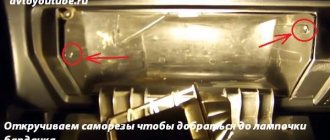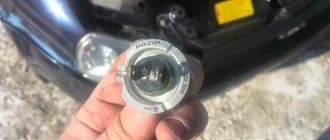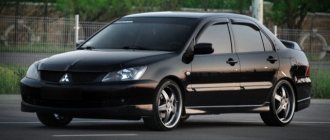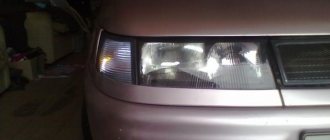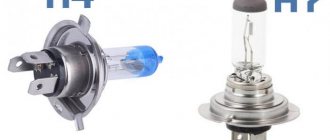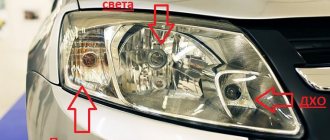So, the car’s headlight went out and it became “one-eyed.” If the installation of the lighting elements was carried out in a car service center, and the lamp is still far from expiring, then under the warranty agreement it is obligatory to replace it free of charge. But not every car owner is willing to be left without a vehicle for several days because of such a trifle, as happens when there is a long line for service, so it’s easier to replace the light bulb yourself.
Fortunately, this process in most cases is not particularly difficult, although it is not without some nuances. They need to be analyzed in more detail.
Briefly about the service life of head optics
In principle, any automotive light source has a certain service life, measured in hours, for example:
- for halogen - 600–800 hours;
- for xenon – 2000–2500 hours;
- for LED - up to 20,000 hours.
It is worth considering that 2/3 of the time most drivers drive with low beams, using up the resource of this particular component.
Therefore, if, according to rough estimates, the lamp has already “run past” the period measured by the manufacturer, then, most likely, the time has come to replace the low beam lamp without particularly bothering with diagnosing the causes.
We recommend that you read: What is the fine for driving with a non-working low beam headlight?
Required Tools
Replacing low beam elements differs on different cars. A simple option is open access to the back of the lantern to remove the burnt part and install a new one. In this case, you only need a 10 or 12 key to disconnect the car battery.
On some models, replacement will require removing the bumper, headlight or front wheel to access a special mounting hole. In this case, you should prepare:
- set of wrenches;
- textile;
- several screwdrivers of different sizes.
What is needed for replacement
The main suspect for failure is the lamp. There are two approaches to test its functionality;
- Disconnect the terminal block, turn on the light on the instrument panel and check the presence of voltage at the contacts with a tester.
- Use a multimeter to check the contacts of the light bulb itself for an open circuit (not suitable for gas-discharge xenon lamps).
- Replace the broken element with an adjacent one on the opposite side to differentiate the damage.
If the lamp is working properly, then you will have to check the entire electrical circuit going to the headlight, starting with the safety block.
You can also assess the condition of the light bulb visually.
The halogen filament will be destroyed, which can be seen with the naked eye.
If made poorly, the halogen glass bulb may become deformed.
The risk of both options increases if you leave sweat marks on the glass during installation. In the contaminated area, heat dissipation is disrupted, as a result of which either the tungsten filament burns out or the glass melts. That is why it is not recommended to touch the flask with your hands.
When a xenon light bulb burns out, the inside becomes covered with soot.
This occurs when the ignition unit malfunctions, when an arc discharge occurs inside the bulb.
A burnt-out LED light source does not show itself outwardly, and it will not be possible to check it with a multimeter without disassembling it.
When there is no doubt about the source of the malfunction, it is time to replace the lamp with a new one. For this you will need:
- rubber or cotton gloves;
- screwdriver;
- a new light bulb, identical in parameters to the original one.
Gloves will have to be put on before opening the box with a new device to avoid accidental contact with the glass bulb. For LED light sources this rule is not necessary.
Tips for choosing headlight bulbs
Currently, the most commonly used bulbs are H7 sockets. They are divided into:
- halogen;
- LED;
- halogen with xenon effect;
- xenon
Halogen lamps have the most average performance. These lamps are the most common among car owners. But these lamps are also the shortest lasting due to their high heat. Halogen lamps with xenon effect always have an increased service life compared to conventional halogen lamps.
LED lamps are more economical, but are more vulnerable to external influences: impacts, shocks. But at the same time, LED lamps are record holders in terms of service life. Also, having purchased these light bulbs, you may encounter some difficulties when adjusting the light beam, described below in the article.
Xenon lamps are immune to shock and vibration. Their temperature regime is closest to that of daylight. But not everyone can afford such lamps due to their high cost. Also, xenon bulbs require the installation of an additional light ignition unit.
As a rule, when choosing replacement light bulbs, drivers are guided by reliability and low cost. An important factor is also the efficiency of lamps in conditions of poor visibility. Philips and BOSCH bulbs fit these criteria perfectly among halogen bulbs. Philips light bulbs, like almost all other products from this company, are the longest-lasting halogen lamps, but also less bright.
This is interesting: Ford Mondeo fuse box
An exception is Philips “X-Treme Vision”, which produces LED bulbs with increased luminous flux, but their service life is lower than that of their classmates. BOSCH lamps, on the contrary, wear out faster, but, as a rule, they shine brighter. The color range of the light beam from BOSCH light bulbs is also more diverse.
Among LED light bulbs, the highest quality ones are Philips “X-Treme Vision” and the Korean “MTF-Light Argentum” series with high glow temperature and brightness.
The most popular halogen bulbs with xenon effect are produced by Koreans. "MTF-Light Palladium" is a lamp with a fairly high glow temperature (5500 K) and the attractive effect of expensive xenon. This model is also the most budget-friendly of xenon lamps. Also worth highlighting is “Osram Cool Blue Intense”, which is visually close to the original xenon. The light emanating from such a lamp has an attractive white-blue tint.
The most popular xenon lamp in Russia is “MaxLux H7”. The ratio of its cost and characteristics is quite favorable. This lamp, with a cost of up to 950 rubles, has milky white and bluish shades and a glow temperature from 4300 to 6000 K. The disadvantage of the lamp is its production in Chinese Sho-Me factories, which sometimes gives reason to doubt the quality and integrity when delivering goods to the shops.
Always carefully check the lamps you purchase for unexpected cracks or deformations!
For more expensive models, there are top Japanese manufacturers such as KOITO MANUFACTURING. The cost of such lamps is the highest, but the quality is strikingly different from their colleagues for the better.
You can find the cheapest light bulbs from domestic ones and from Dialuch. But only one thing can be said about these light bulbs - their low price fully corresponds to their quality. Such bulbs are more suitable for owners of domestic cars and cars assembled in Russian factories (for example, Hundai “Accent” and Renault “Logan”).
How to choose the right lamp
It is important that the light source corresponds to the technical documentation of a particular vehicle, since installing a more powerful or weaker device can damage the electronic control unit of the vehicle systems. To select the required model, you can remove the broken light source and take it with you to the auto supply store. Consultants will help you understand the markings and select a replacement with the appropriate base and power, although it’s not difficult to figure it out yourself.
The most common types of sockets for automobile headlight lamps.
Checking the fuse
Since one of the common causes of problems with low beams is a malfunction in the safety unit, work begins from this place.
Checking the fuse
In most cases, the fuse block is located next to the battery. To replace, the latches of the block cover are pressed out, after which it is easily removed. Most vehicle manufacturers leave a detailed diagram on the inside of the block cover that shows which specific circuit each fuse is responsible for. If there is no such diagram, then you will have to look for it in the operating instructions. If the fuses are in order, then you need to proceed to the next step.
Correctly replacing a low beam lamp
If there is an adapter on the lamp base, it must be disconnected and connected to the new device.
Lamp with adapter.
For bases H4, H7, H19, special projections are located in such a way that they can only be placed in one position. Structural grooves in the headlight will not allow the lamp to be placed on the wrong side. Subsequent assembly occurs in reverse order:
- Using clean gloved hands, without touching the glass bulb with your fingers, the light bulb is placed in the seat with the ears in the structural grooves. At the same time, it is sometimes more convenient to install a light bulb by visually monitoring the process from the front, through the glass of the headlight.
- The protective cover is put on.
- The terminal block is connected.
- With the appropriate design, the headlight unit is closed with a lid.
After carrying out the manipulations, you need to connect the power cable to the battery contacts and check the functionality of the new lighting elements.
If the flask is accidentally contaminated, then before installation it must be thoroughly wiped with alcohol and dried with a dry cloth.
Is the problem really with the lamp?
The first thing to do is to rule out other causes of car lighting failure. If none of the 3 assumptions below are confirmed, you can confidently simply replace the burnt-out lamp.
What could have happened?
- Oxidation of relay contacts. If the headlight does not light for this reason, you will hear characteristic clicks when you listen to the relay operation. In this case, additional cleaning of the power terminals will be required.
- The fuse has blown. The deformation of this spare part is not a cause, but a consequence, it doesn’t just break, you need to look for the source of the problem. It is possible that moisture may get on the base, but here it is better to contact service.
- There is no voltage at the connector contacts, then it is better to immediately contact an auto electrician.
How to replace a light bulb
To replace a headlight bulb, you need to open the hood of the car and find the socket on the back wall of the headlight housing. You can identify it by the bundle of wires that connect to the removable cover. First you need to disconnect the plug with wires from the cover. Next, you need to remove the cover block itself. In most cases, it is attached to the headlight housing in the following ways.
- Plastic clip. In this case, there should be a plastic lever at the top of the cover. By pressing it and simultaneously pulling the cover towards you, you can disconnect it from the headlight housing.
- Metal clamp. In this case, you just need to pull the cover towards you - it should easily come away from the headlight housing.
- Screw cap. This is the most common option for attaching the cover to the headlight housing. In this case, you just need to turn it counterclockwise until the lid moves away from the body.
The bulb itself is attached to the inner surface of the blocking cover, so after the blocking cover is disconnected from the headlight housing, a new lamp can be installed. To remove a burnt-out light bulb from the base, you just need to pull it out of the groove, in some cases you will have to turn it slightly counterclockwise.
It is necessary to wear gloves when screwing in a new halogen light bulb, since even the slightest dirt or fingerprints on the glass can lead to rapid failure of the lamp. The further installation procedure is done in reverse order. The cover block is installed in the rear part of the headlight housing, and after that a plug with wires is connected to it.
Unfortunately, on some car models, replacing a light bulb requires completely removing the headlight. In such a case, the above steps are carried out on a headlight that has already been disconnected from the car. An even more difficult case is when replacing a light bulb requires dismantling the radiator grille and front bumper, as when replacing a light bulb in the headlight of a Volkswagen Golf IV.
Halogen and xenon light
Automakers use various lighting technologies on their cars. Halogen and xenon light bulbs or ultra-modern LED lighting have become widespread. Each of these technologies has certain advantages and disadvantages. For example, LEDs can operate for many years and do not require replacement or any maintenance. However, due to its high cost, such lighting equipment is installed exclusively on business and premium class cars .
Advantages of halogen light:
- low price;
- ease of installation;
- safe work;
- minimal energy consumption;
- wide range of applications;
- simplicity of the headlight design.
Halogen headlights were most popular in the eighties and nineties of the last century. They have an affordable price, providing the proper level of illumination of the roadway at night. However, today, with stricter requirements in the field of automobile safety, halogens no longer meet established standards, so most automakers have abandoned their use on their cars. They have been replaced with more modern, durable and high-quality xenon headlights.
It will also be interesting: GDI engine: how it differs from analogues (advantages and disadvantages)
Advantages of xenon light:
- the presence of two electrodes instead of a filament;
- high-quality road lighting;
- powerful directional or diffused light.
The only drawback of xenon bulbs is their high cost, which can be an order of magnitude higher than the cost of halogen. The duration of operation of such lighting elements should be taken into account. Their service life is 2-3 thousand hours.
Another feature of using xenon is the fact that it is mandatory to install headlight washers - this helps prevent light scattering and dazzling drivers of oncoming cars.
How to change glass
Sometimes a stone thrown from under the wheels of another car can break the glass of the headlight without damaging other elements of the headlight. A minor accident can lead to similar consequences. In such cases, replacing the entire headlight will not be practical. Especially if it is expensive. The car owner can try to replace only the lamp glass, although this is more difficult to do than simply replacing the headlight assembly.
To replace the glass, you must completely remove the headlight from the car. After this, remove the damaged glass from it by “unfastening” the plastic latches with which it is attached to the headlight. This must be done carefully, as they may stick to the headlight housing. In addition to the latches, the glass of the flashlight is attached to the body using heat-resistant sealant, so you may have to pry it off with a screwdriver, or even cut off the glass using a glass cutting disc.
It is necessary to clean the edges of the headlight housing from the remnants of the factory adhesive-sealant using a cleaner. Alternatively, you can try using gasoline or white spirit thinner.
Apply a layer of new sealant to the headlight housing and insert the new glass, fastening the latches. Then you should place the flashlight with the glass down so that its weight presses the glass against the headlight housing. It will take at least a day for the sealant to dry. After checking the tight fit of the glass to the body, you can begin reinstalling the headlight in place.
For any manipulations with the flashlight, two conditions must be met:
- Do not touch the headlight reflector, as the slightest contamination will lead to incorrect operation of the lamp;
- You should ensure that the headlight is completely sealed after gluing the glass - otherwise condensation will form in it, and the lamp itself will sweat.

